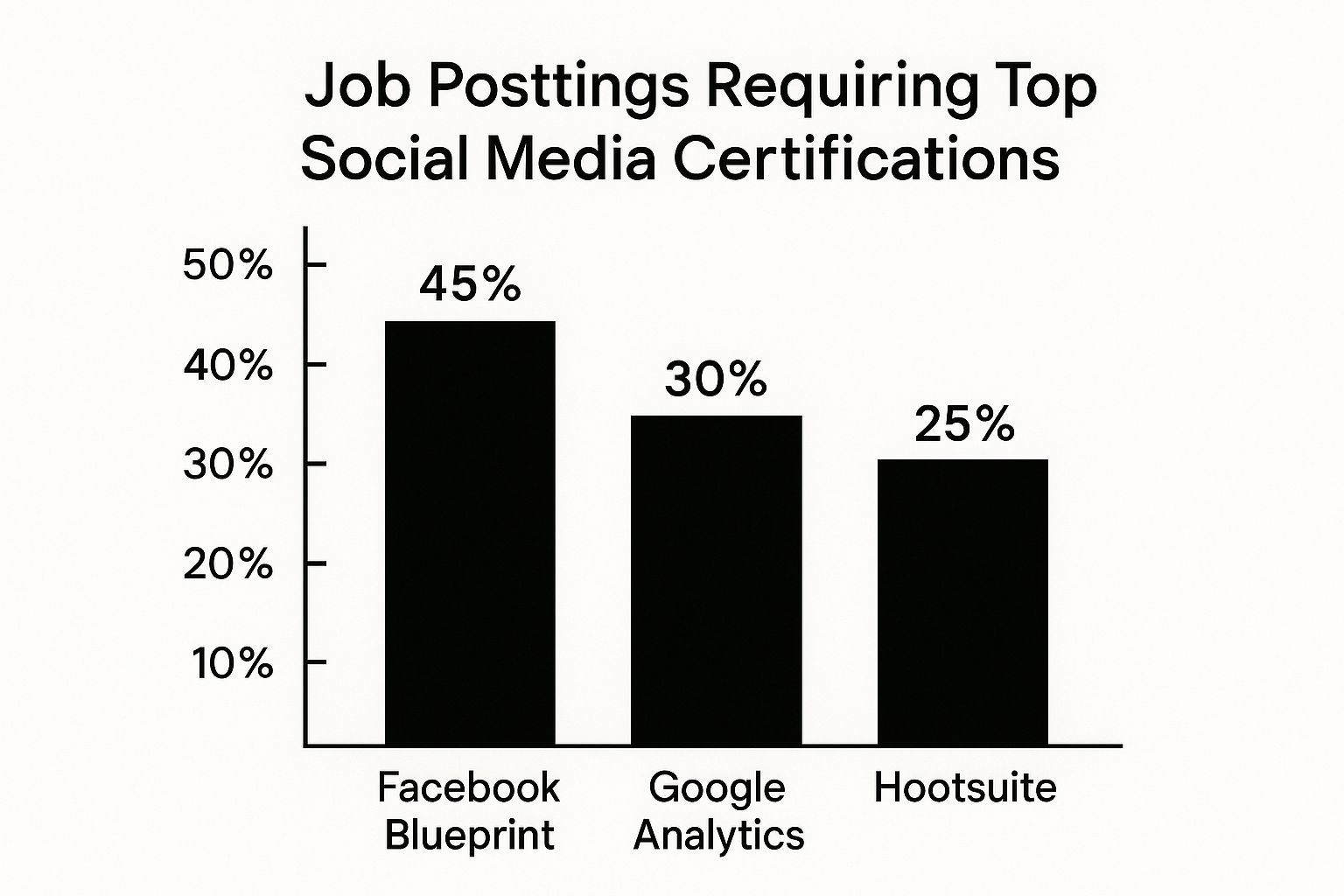
Social Media Marketing Career Path: Your Ultimate Guide
Published
Understanding Today's Social Media Marketing Landscape
The social media marketing landscape is constantly changing, creating exciting career opportunities. This dynamic field is now crucial for businesses of all sizes, from small startups to large corporations. This shift isn't just a passing trend; it represents a fundamental change in how businesses interact with their audiences.
Beyond the Basics: Diverse Roles in Social Media Marketing
Unlike traditional marketing roles with their clearly defined boundaries, social media marketing offers a much broader range of specializations. This allows individuals to find a niche that truly aligns with their unique skills and interests. Roles like Social Commerce Specialists, Community Strategists, and Brand Safety Managers are becoming increasingly vital. These specialized positions highlight the expanding role of social media in the business world and allow professionals to cultivate highly sought-after expertise.
The Impact of Remote Work and Creative Freedom
The rise of remote work has significantly influenced social media marketing careers. This flexibility allows professionals to work from anywhere in the world, opening doors to global opportunities. Furthermore, social media marketing often provides more creative freedom than traditional marketing. Social media platforms inherently encourage experimentation and innovation. This allows marketers to test new approaches and create unique campaigns, fostering a culture of continuous learning and adaptation.
The Growing Demand for Social Media Expertise
The demand for social media marketing skills is undeniable. Social media spending is projected to reach $276.7 billion in 2025, with a 10% annual growth rate. With approximately 5.42 billion social media users worldwide projected for 2025, businesses are increasingly reliant on these platforms to connect with their target audiences. This substantial growth translates into a high demand for skilled professionals. Discover more insights about social media statistics. A strategic and well-defined social media presence is now essential for businesses to succeed. This creates numerous job opportunities for those pursuing careers in this ever-evolving field. Understanding the changing needs of businesses and the preferences of consumers is paramount to success in social media marketing.
Essential Skills That Actually Get You Hired

Forget generic skills lists. Let's explore the specific abilities hiring managers look for in the competitive social media marketing field. These insights come directly from interviews with recruiters and successful professionals.
Technical Prowess: The Foundation of Success
A solid technical foundation is crucial for any aspiring social media marketer. This goes beyond simply knowing how to post. It involves understanding the intricacies of each platform's algorithm, advertising capabilities, and analytics tools.
Paid Social Management: Mastering paid campaigns across platforms like Facebook and Instagram is highly valuable. This includes targeted advertising, budget allocation, and performance analysis.
Content Optimization: Understanding SEO, keyword research, and content formatting is essential for organic reach and engagement. Optimizing content ensures it's discoverable by the right audience.
Analytics Expertise: Data analysis is key. Knowing how to use analytics tools like Google Analytics is important, but the ability to translate that data into actionable insights is even more valuable. Data storytelling, communicating data's meaning clearly and concisely, is a highly sought-after skill.
Soft Skills: The Differentiator
While technical skills provide the foundation, soft skills set you apart. These are the skills that enable effective collaboration, persuasive communication, and adaptation to the ever-changing social media world.
Communication: Clear and concise communication, both written and verbal, is crucial. Effectively conveying ideas and strategies to clients and colleagues is paramount.
Strategic Thinking: The ability to think strategically about campaigns, anticipate trends, and adapt to changes is essential. This doesn't necessarily require years of experience, but a demonstrable ability to think critically and creatively.
Creativity: Social media marketing is inherently creative. Developing engaging content, designing visually appealing graphics, and innovative thinking are essential for capturing attention and building a strong brand presence.
Emerging Skills: Staying Ahead of the Curve
Social media marketing is constantly evolving. Forward-thinking professionals are already developing these competencies:
AI Integration: As AI becomes more prevalent in marketing, understanding how to use tools for content creation, automation, and analysis is increasingly important.
Influencer Relationship Management: Building and nurturing relationships with influencers is crucial for successful influencer marketing campaigns.
Crisis Communication: Knowing how to navigate and mitigate online crises is a critical skill. Understanding established social media marketing tips can be especially helpful in these situations.
The social media marketing career path demands adaptability. In 2025, authenticity and genuine interaction are crucial, as audiences seek meaningful connections with brands. This means data-driven decisions and prioritizing engagement over reach are key for success. Learn more about marketing trends. Continuous learning and a proactive approach are essential for thriving in this dynamic field.
Breaking In: From Zero to Your First Social Media Role
Landing your first social media marketing role isn't about a flawless resume. It's about showcasing genuine passion and strategic thinking. This means demonstrating a deep understanding of social media's power and how it can drive business objectives.
Building Your Portfolio: Showcasing Your Potential
Building a strong portfolio is essential, even without prior professional experience. Personal projects, volunteer work, or managing social media for a friend's business can provide valuable examples of your skills.
For example, if you helped a local business increase their Instagram followers by implementing a new content strategy, this demonstrates practical experience you can showcase. This allows you to demonstrate real-world impact and gain practical experience, which can be highlighted in your applications and interviews.
You might be interested in insights into current opportunities: Social Media Marketing Jobs.
Targeting Entry-Level Positions: Strategic First Steps
Identifying the right entry-level positions is key for career growth. Roles like Social Media Coordinator, Content Creator, or Community Manager often offer excellent learning opportunities.
These positions allow you to gain experience across various aspects of social media marketing, setting the stage for future specialization. Focusing on roles that align with your interests and long-term career goals will help you gain relevant experience and build a solid foundation.
The infographic below highlights the percentage of job postings requiring top social media certifications:

As you can see, Facebook Blueprint is the most requested certification at 45%, followed by Google Analytics at 30%, and then Hootsuite at 25%. This data emphasizes the importance of obtaining relevant certifications to enhance your job prospects.
Once you've built your skillset, you'll need to understand how to approach the job market. For those considering international opportunities, this resource can be helpful: apply for jobs abroad.
Standing Out from the Crowd: Application and Interview Tips
Even with less experience, you can still outshine more qualified competitors. Tailoring your resume and cover letter to each specific role, highlighting relevant skills and experiences, is essential.
Additionally, showcasing your passion for social media and demonstrating a strong understanding of the platform's nuances can make a significant difference. Preparing thoroughly for interviews by researching the company and practicing your responses to common interview questions will boost your confidence and increase your chances of success.
To help you prepare, here's a comparison of common entry-level social media roles:
Entry-Level Social Media Marketing Positions Comparison
| Position | Key Responsibilities | Required Skills | Average Salary Range |
|---|---|---|---|
| Social Media Coordinator | Creating and scheduling engaging content, monitoring social media channels, analyzing performance metrics, and interacting with followers. | Strong communication and writing skills, proficiency in social media platforms, analytical skills, and basic graphic design skills. | $35,000 - $50,000 |
| Content Creator | Developing various content formats (text, images, videos) for social media, optimizing content for different platforms, and maintaining brand consistency. | Creative writing and visual storytelling skills, knowledge of content creation tools, understanding of social media algorithms, and SEO knowledge. | $40,000 - $55,000 |
| Community Manager | Building and nurturing online communities, fostering engagement through interactive content and discussions, managing social media crises, and representing the brand voice. | Excellent communication and interpersonal skills, strong understanding of community building strategies, ability to handle online conflicts, and customer service experience. | $45,000 - $60,000 |
This table highlights the key distinctions and similarities between these roles, giving you a clearer idea of which path might be the right fit for your skillset and aspirations. Researching salary expectations in your area can further refine your job search strategy.
Mapping Your Path: Specializations That Pay Off

Not all social media marketing career paths offer the same opportunities. This allows professionals to specialize in areas that best suit their skills, which is a key differentiator in a competitive job market.
From Generalist to Specialist: Defining Your Niche
Many social media marketers begin their careers as generalists, handling a wide range of tasks from content creation to data analysis. However, transitioning to a specialist role can significantly improve career prospects. This transition involves focusing on a particular area within social media marketing.
For example, a generalist who enjoys data analysis might choose to specialize in paid social media advertising. Someone with excellent interpersonal skills might thrive in influencer marketing. This focused approach allows professionals to develop deep expertise within a specific niche. Interested in exploring social media marketing careers? Check out this resource: Social Media Marketing Careers.
High-Demand Specializations: Where the Money Is
Some social media marketing specializations consistently offer higher salaries. These in-demand areas often reflect evolving industry needs and emerging trends.
Paid Social Media Advertising: Businesses are increasing their investment in online advertising, making specialists in paid social campaigns highly valuable. Their expertise in targeting, budgeting, and optimization delivers measurable results.
Influencer Marketing: As influencer marketing continues to expand, professionals skilled in identifying, managing, and partnering with influencers are increasingly sought after. They play a vital role in connecting brands with their target audiences through authentic collaborations.
Social Media Management: Effective social media management encompasses content strategy, community building, and crisis management. These professionals ensure consistent brand messaging and protect a company’s online reputation.
Emerging Opportunities: Staying Ahead of the Curve
The social media landscape is dynamic, creating exciting new opportunities for proactive professionals.
Social Commerce: With the growth of in-app purchases and shoppable posts, specializing in social commerce is a promising career path. This specialization focuses on driving sales directly through social media platforms.
AR/VR Marketing: As augmented reality (AR) and virtual reality (VR) technologies become more integrated with social media, specialists in these fields will be increasingly valuable. This offers exciting potential for innovative marketing campaigns.
By specializing and adapting to new technologies and trends, social media marketing professionals can build successful and rewarding careers in this dynamic field.
Riding The Wave: Future-Proofing Your Social Media Career
The social media marketing career path is in constant motion. Savvy professionals understand the importance of anticipating change rather than simply reacting to it. This means looking beyond the current trends to understand the deeper forces shaping the future of this dynamic field.
Emerging Skills for Tomorrow's Social Media Marketer
The foundational skills of social media marketing—content creation, analytics, and community engagement—remain critical. However, new skills are becoming increasingly important as technology and consumer behavior change. For instance, Artificial Intelligence (AI) is transforming social media roles. This doesn't mean marketers will be replaced by robots. Instead, AI tools will empower marketers to work more efficiently. These tools can automate repetitive tasks, personalize content at scale, and unlock deeper data insights.
This shift creates a growing demand for marketers who can effectively use AI, interpret AI-generated data, and still maintain a human touch in brand communications. Furthermore, the rise of social commerce represents a valuable area of specialization. With more consumers shopping directly through social media platforms, brands need experts who can optimize product listings, manage in-app purchases, and design engaging shopping experiences.
Adapting to the Changing Social Media Landscape
The social media landscape is constantly shifting. New platforms emerge, algorithms are updated, and consumer preferences evolve. This constant state of flux demands adaptability. Building a future-proof social media career requires a proactive approach to learning and professional development. Staying up-to-date on industry news, experimenting with new tools, and pursuing continued education will be essential.
The growing importance of community building also adds a new dimension to social media marketing. Authenticity and genuine connection are crucial. Marketers who can cultivate thriving online communities will be in high demand. Social media marketing is a subset of the broader digital marketing field, which is experiencing significant growth. Digital marketing jobs are projected to increase by 6%, fueled by the growing complexity of digital platforms. This highlights the need for specialized skills in social media and related areas.
Building a Resilient Career Strategy
Future-proofing your career is not just about learning new skills; it's also about cultivating a resilient mindset. This involves embracing lifelong learning, nurturing curiosity, and adapting to change. Building a robust professional network is also essential. Connecting with other marketers, attending industry events, and participating in online communities can provide invaluable support and insights.
Finally, consider the value of transferable skills. While platform-specific knowledge is important, developing broader skills like strategic thinking, project management, and communication will serve you well, no matter how social media evolves. These core competencies remain valuable across various roles and industries, ensuring your career can adapt to any changes. By focusing on these strategies, you can build a thriving social media marketing career that not only survives but thrives amidst constant change.
Building Your Brand While Building Your Network

Your personal brand is essential for a successful social media marketing career. It's a career accelerator, not just a nice addition to your resume. This section explores how social media professionals use their platforms for career advancement.
Showcasing Expertise Without Self-Promotion
Building a strong personal brand involves showcasing your expertise authentically. This means sharing valuable insights and contributing to industry discussions, all while demonstrating your skills without overt self-promotion.
For example, you can share case studies of successful campaigns, offer commentary on industry trends, or provide helpful tips and resources to your followers. This demonstrates your knowledge and builds credibility, positioning you as a thought leader and attracting new opportunities.
Engaging With Industry Leaders and Building Relationships
Networking is crucial in any field, and social media provides powerful tools for connection. Engaging with industry leaders on platforms like Twitter and LinkedIn by commenting on their posts, sharing their content, and participating in relevant discussions can help you build valuable relationships.
Avoid generic comments. Instead, focus on adding value to the conversation. Ask thoughtful questions, offer unique perspectives, and contribute meaningfully to the discussion. This will help you stand out and build genuine connections.
Platform Strategies for Networking at Different Career Stages
Different platforms offer unique networking opportunities depending on where you are in your career. While LinkedIn is generally considered the primary platform for professional networking, platforms like Twitter and even Instagram can be valuable depending on your industry.
Early Career: Focus on creating a complete LinkedIn profile, connecting with peers and mentors, and engaging in relevant groups.
Mid-Career: Share thought leadership content on LinkedIn and Twitter, participate in industry events (both online and offline), and actively engage with influencers in your niche.
Senior-Level: Speak at conferences, publish articles, and use your social presence to further build your brand and attract high-level opportunities.
Balancing Personal and Professional Content: Authenticity Is Key
Balancing personal and professional content can be tricky. While showcasing your expertise is important, maintaining authenticity is crucial. Sharing some personal interests and experiences can help you build a more relatable and engaging online presence.
Be mindful of your audience and avoid sharing anything that could damage your professional reputation. Consider creating separate accounts for personal and professional content if you prefer to keep them distinct. Remember that anything you post online could be seen by potential employers or clients. Always present yourself professionally and respectfully.
Handling Online Criticism: Grace Under Pressure
Navigating online criticism is an unavoidable part of building a social media presence. Responding professionally and constructively to negative comments or feedback is essential. Avoid engaging in arguments or becoming defensive.
Address criticism calmly and respectfully, offering solutions or explanations where appropriate. This demonstrates professionalism and maturity. If the criticism becomes abusive or harassing, it's best to ignore it or report it to the platform.
Building your personal brand and expanding your network is an ongoing process. By showcasing your expertise, engaging meaningfully with others, and navigating online interactions strategically, you can use social media to accelerate your social media marketing career.
Money Matters: Realistic Salary Expectations and Growth
A thriving career in social media marketing isn't just about likes and followers. It's also about building a financially secure future. This section explores realistic salary expectations, growth potential, and smart financial strategies for social media marketing professionals.
Entry-Level Earnings and Growth Potential
Starting salaries in social media marketing vary based on factors like location, company size, and the specific role. Entry-level positions such as Social Media Coordinator or Community Manager typically range from $35,000 to $60,000 per year. However, with experience and specialized skills, significant salary growth is possible. For more detailed information, take a look at this resource on Social Media Manager Salary.
Transitioning from a Coordinator to a Manager role, for example, can boost earnings to $60,000-$90,000. Further specialization in areas like paid advertising or influencer marketing can lead to even higher salaries.
Factors Influencing Earning Potential
Several factors significantly impact earning potential in social media marketing.
Specialization: High-demand specializations like paid social media advertising and influencer marketing often command higher salaries.
Company Size and Industry: Larger companies and industries with bigger marketing budgets tend to offer more competitive compensation packages.
Geographic Location: Salaries can differ significantly based on location, with major metropolitan areas generally offering higher pay.
Freelancing vs. Full-Time Employment
The choice between freelancing and full-time employment significantly impacts both income and lifestyle. Freelancing offers flexibility and the potential for higher per-project earnings but requires self-management and client acquisition. Full-time employment provides stability, benefits, and consistent income but may initially limit earning potential.
Salary Progression and Negotiation
Strategically planning your salary progression is essential. This includes researching industry benchmarks, acquiring in-demand skills, and confidently negotiating better offers. Don't underestimate the value of professional certifications or specialized training in areas like data analytics or AI marketing. These can substantially enhance your earning potential.
To help illustrate potential salary ranges, let's look at the table below:
Social Media Marketing Salary Ranges by Experience Level: This table provides a detailed breakdown of salary expectations across different experience levels and role types in social media marketing.
| Experience Level | Role Type | Salary Range | Key Factors |
|---|---|---|---|
| Entry-Level (0-2 years) | Social Media Coordinator/Community Manager | $35,000-$60,000 | Location, company size, industry |
| Mid-Level (3-5 years) | Social Media Manager/Specialist | $60,000-$90,000 | Specialization (e.g., paid advertising, influencer marketing), performance metrics |
| Senior-Level (6+ years) | Social Media Director/Strategist | $90,000-$150,000+ | Leadership experience, strategic planning skills, team management |
As this table demonstrates, experience and specialization play key roles in determining salary expectations within the social media marketing field. Moving into leadership and strategic roles can significantly increase earning potential.
Building Multiple Income Streams
As your expertise grows, consider building multiple income streams. This diversifies your income and maximizes earning potential. Options could include consulting, online courses, or creating and selling digital products related to social media marketing. This not only boosts your income but also establishes you as a thought leader in the industry.
Ready to start a rewarding social media marketing career? Explore exciting opportunities and connect with top companies at Influencer Marketing Jobs.